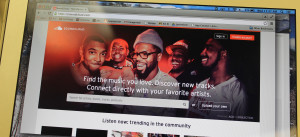“All the time! All the time!”
That’s how often junior AJ McCrea says he is asked to rap battle someone else.

“If somebody tells me to freestyle, I can freestyle, or if they want something written, I can do something written,” McCrea said. “I’m not nervous at all to rap in front of anybody now.”
McCrea has been an aspiring rapper since age nine and frequents social media to upload his music. In March of this year, a fan page re-uploaded one of his old videos to YouTube, telling viewers the story behind his music. After Twitter user Jessica (@HeyTenenbaum) drew the attention of her 51.5K followers to his music, the video hit it big. It has since amassed over three million views. In August, she tweeted videos of him rapping and the most popular garnered 1.2K retweets.
“Rapping, originally, was kind of a stress reliever, but ever since my dad left and then I went into foster care, I got really deep into it,” McCrea said. “It kind of went from there.”
McCrea says his stylistic flow is inspired by Compton rapper Kendrick Lamar and poet Black Ice.
McCrea uses a variety of social media platforms to promote his music and connect with listeners including Twitter, Instagram, Facebook, YouTube and SoundCloud.
Senior Christian Lassiter shared thoughts on SoundCloud and its popularity among up-and-coming artists, like McCrea.
“It’s a good place for people to do mixes and get their stuff out there,” Lassiter said. “[It’s for] people who are trying to get other people to know them as an artist.”
Senior Deshawn Alston also uses SoundCloud to post his work. He produces music; this includes everything from making beats, remixing songs, working with vocals on tracks and collaborating with other artists.
“I was like, ‘Well if I want to make music, I need to get it out there,’ so I posted [my music] on SoundCloud,” Alston said. “I’ve just been posting, and people have been liking it and commenting.”
Alston was a DJ before he started to create his own music and has been doing it for about a year now. He explained a bit of his creative process.
“I normally start with a kick snare, or I listen to a sample that I like, and I break it apart,” Alston said. “I kind of make a different sound with it. A lot of my music is kind of galaxy or outer space-type stuff. I’ll take music from everywhere and then make it into something different.”
SoundCloud was founded in 2007 in Stockholm by Swedish sound designer Alexander Ljung and artist Eric Wahlforss. The audio distribution company is popular among on-the-rise artists and was acquired by Twitter in May 2014 for $2 billion.
“We are uniquely positioned in that spectrum of services,” Wahlforss said in a 2013 interview with website Whiteboard. “We rely on a community of audio creators, and that’s something that nobody else has. It’s less about search and listen. SoundCloud is audio that reaches you in various ways.”
SoundCloud’s appeal mainly comes from its user-friendly interface and that it operates at no cost to users. Lassiter talked about its ease compared to traditional methods of distributing music.
“It’s a free service that anybody can use, and you can upload whatever you want on there,” Lassiter said. “It’s easier than selling records. It’s a lot quicker.”
However, there is a threshold on the amount of audio uploaded.
“[It’s free] for a certain amount of time,” McCrea said. “You have an hour of uploading, and each song is three minutes, so you can upload however many songs it takes to make an hour; after that, if you want to make it bigger than that, you have to pay for it.”
It is free for McCrea to have his music public, accessible and interactive to anyone with a computer or smartphone. Similarly, Alston works with social media to promote his work.
“You can link your account to Instagram, and people can go on there and look at you,” Alston said. “It’s really inspiring to see people’s reactions to my music because that’s what makes me want to keep making it.”
McCrea’s songs are written down in notebooks and stored in word documents created on the bus ride home, and the junior says that they come from his own experiences.
“Pain is the best story,” McCrea said. “I could be in a room full of people and still feel isolated from the entire universe, and it’s like, when I start writing, it’s just incredibly phenomenal.”
When asked about pursuing a music career in the future, McCrea’s response was simple.
“Definitely. That’s not even a question.”
– By Hunter Koch
